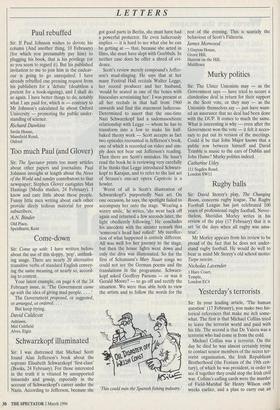Schwarzkopf illuminated
Sir: I was distressed that Michael Scott found Alan Jefferson's book about the soprano Elisabeth Schwarzkopf 'first-class' (Books, 24 February). For those interested in the truth it is vitiated by unsupported innuendo and gossip, especially in the account of Schwarzkopf's career under the Nazis. According to Jefferson, because she got good parts in Berlin, she must have had a powerful protector. He even ludicrously implies — it is hard to see what else he can be getting at — that, because she acted in films, she must have slept with Goebbels. In neither case does he offer a shred of evi- dence.
Scott's review merely compound's Jeffer- son's mud-slinging. He says that at her many Festival Hall recitals Walter Legge, her record producer and her husband, `would be seated in one of the boxes with binoculars scrutinising her'. I was present at all her recitals in that hall from 1960 onwards and find this statement ludicrous. Determined to assert that the one-time Nazi Schwarzkopf had a sadomasochistic relationship with Legge — whom he has to transform into a Jew to make his half- baked theory work — Scott accepts as fact two episodes recounted in Jefferson's book, one of which is recorded on video and sim- ply does not bear out Jefferson's reading. Then there are Scott's mistakes. He hasn't read the book he is reviewing very carefully if he thinks that Legge introduced Schwarz- kopf to Karajan, and to refer to the last act of Strauss's one-act opera Capriccio is a howler.
Worst of all is Scott's illustration of Schwarzkopf's purportedly Nazi art. On one occasion, he says, the spotlight failed to accompany her onto the stage. 'Wearing a wintry smile,' he writes, 'she went back off again and returned a few seconds later, the light obediently following.' He concludes his anecdote with the sinister remark that `someone's head had rolled!' My recollec- tion of what happened is entirely different. All was well for her journey to the stage, but then the house lights went down and only the diva was illuminated. So for the first of Schumann's Mary Stuart songs we could not see the German poems and the translations in the programme. Schwarz- kopf asked Geoffrey Parsons — or was it Gerald Moore? — to go off and rectify the situation. We were thus able both to view the artists and to follow the words for the `This could ruin the Spanish fishing industry.' rest of the evening. This is scarcely the behaviour of Scott's Fiihrerin. James Morwood
3 Gayton House, Grove Hill, Harrow on the Hill, Middlesex


































































 Previous page
Previous page